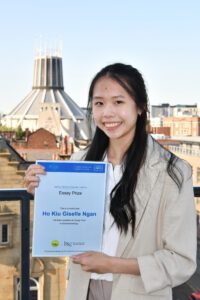Ho Kiu Giselle Ngan
Conducted the first genome-wide association studies (GWAS) in the South Asian population to identify genetic factors associated with non-alcoholic fatty liver disease (NAFLD).
Medical Student Essay Prize Winner
“A Genome-wide Association Study of Non-alcoholic Liver Disease in India.”

Ms Ngan describes that non-alcoholic fatty liver disease (NAFLD) is one of the leading causes of end-stage liver disease and liver transplantation. Despite the well-established bidirectional association between obesity and NAFLD, there has also been an increasing percentage of NAFLD in lean individuals. Ms Ngan comments how the prevalence of NAFLD across different ethnicities does indeed highlight the role of genetics in the pathogenesis (the manner in which a disease develops) of NAFLD.
Ms Ngan explains:
The term ‘Asia paradox’ describes the phenomenon where there is a high percentage of lean patients in Asia, especially in Indians where non-obese NAFLD accounts for 75% of all cases.
The emergence of genome-wide association studies (GWAS) allows the
identification of genotype-phenotype associations of multifactorial diseases like NAFLD. A GWAS has been performed in the European population and four risk loci associated with NAFLD were identified. However, despite the growing burden of NAFLD in Asia no similar GWAS has ever been performed. Our project conducted the first GWAS in the South Asian population to identify genetic factors associated with NAFLD in Indians, as well as to compare and validate associations identified in other populations.
 The lack of association between previously identified genetic risk, in addition to a few other elements of the study, suggests that there are differences in genetic risk profile in the South Asian population compared to others. This study brings new insights into genetic risk factors associated with NAFLD which opens doors to further research into potential candidates.
The lack of association between previously identified genetic risk, in addition to a few other elements of the study, suggests that there are differences in genetic risk profile in the South Asian population compared to others. This study brings new insights into genetic risk factors associated with NAFLD which opens doors to further research into potential candidates.
By gaining a deeper understanding of genetic risk factors, novel pathogenesis mechanisms and pathobiology of NAFLD may be uncovered. This can facilitate the identification of high-risk individuals and contribute to the development of optimal, ethnic-specific screening guidelines and novel therapeutics for NAFLD.
Why did you choose this project?

“My interest in research was sparked when I shadowed a research doctor and I could see how her research work influenced her clinical decision-making. Additionally, I have a keen interest in hepatology and both these things inspired me to explore how basic research can translate into, and guide clinical practice.”
It is a great honour for me to receive the Dr Falk / Guts UK Essay Prize. I aspire to further explore the field of Hepatology and translational medicine in order to promote personalised medicine and benefit a wider population. This award provides great encouragement to pursue a medical career involving clinical research to help progress medicine.
- Ms Ho Kiu Giselle Ngan



